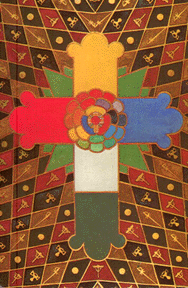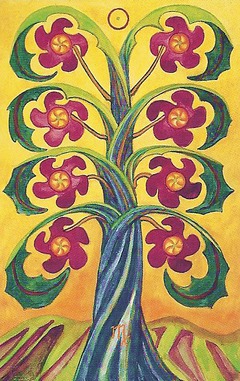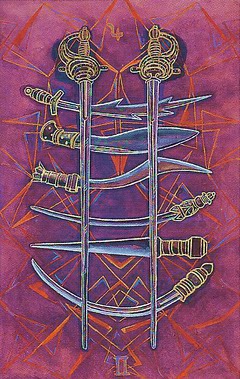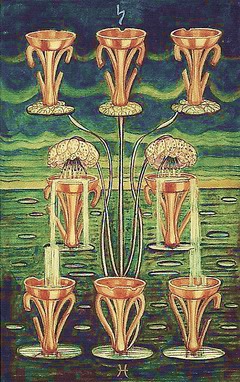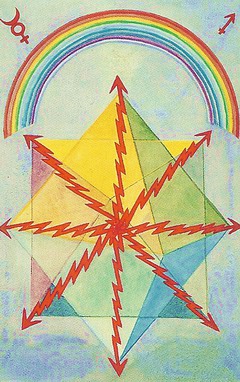Hod

The Four Eights
The four Eights are attributed to Hod. Being in the same plane as the Sevens on the Tree of Life, but on the other side, the same inherent defects as are found in the Sevens will apply.
Yet one may perhaps urge this alleviation, that the Eights come as (in a sense) a remedy for the error of the Sevens. The mischief has been done; and there is now a reaction against it. One may, therefore, expect to find that, while there is no possibility of perfection in the cards of this number, they are free from such essential and original errors as in the Lower case.
The Eight of Wands is called Swiftness, as one might expect from its attribution to Mercury and Sagittarius. This is an etherealization of the idea of fire; all gross elements have disappeared.
(Let there be a short digression with regard to the signs of the Zodiac. In the case of each element, the Cardinal sign represents the swift, impulsive onrush of the idea. In the Kerubic sign, the element has come to its full balance of power; and in the other signs the force is fading away. Thus, Aries represents the rush of fire, Lightning; Leo, its power, the Sun; and Sagittarius, the rainbow its sublimation. Similar considerations apply to the other elements. See the Attributions section: The Triplicities of the Zodiac.)
In the Eight of Wands, fire is no longer conjoined with the ideas of combustion and destruction. It represents energy in its most exalted and tenuous sense; this suggests such forms thereof as the electric current; one might almost say pure light in the material sense of that word.
The Eight of Cups is called Indolence. This card is the very apex of unpleasantness. It is ruled by the planet Saturn; time, sorrow, have descended upon pleasure, and there is no strength in the element of water which can react against it. This card is not exactly "the morning after the night before"; but it is very nearly that. The difference is that the "night before" has not happened! This card represents a party for which all preparations have been made; but the host has forgotten to invite the guests; or, the caterers have not delivered the good cheer. There is this difference, though, that it is in some way or other the host's own fault. The party that he planned was just a little bit above his capacity; perhaps he lost heart at the last moment.
The Eight of Swords is called Interference. At first sight, it would seem easy to confuse it with the Eight of Cups; but the idea is, in reality, quite different. The card is attributed to Jupiter and Gemini; accordingly, there is no weighing down of the will by internal or external stress. It is simply the error of being good- natured when good-nature is disastrous. Gemini is an airy sign, an intellectual sign; Jupiter is geniality and optimism. This will not do in the world of Swords; if one must hit at all, a knock-out blow is best. But there is another element in this card; that of unexpected (the Eights, being at heart Mercurial, are always that) interference, sheer unforeseen bad luck. Trivial incidents have often altered the destiny of empires, brought to naught "the best laid plans of mice and men".
The Eight of Disks is called Prudence. This card is a great deal better than the last two, because, in purely material matters, especially those relating to actual money, there is a sort of strength in doing nothing at all. The problem of every financier is, first of all, to gain time; if his resources are sufficient, he always beats the market. This is the card of "putting something away for a rainy day".
Its attribution is Sol in Virgo; it is the card of the husband-man; he can do little more than sow the seed, sit back, and wait for the harvest. There is nothing noble about this aspect of the card; like all the Eights, it represents an element of calculation, and gambling is securely profitable if one has adjusted the cagnotte properly.
There is yet another point which complicates this card. The Eight of Disks represents the geomantic figure Populus, which is an easy-going figure, and at the same time stable. One thinks of Queen Victoria's time, of a man who is "something in the City" rolling up to Town with Albert the Good advertized by his watch- chain and his frock-coat; on the surface he is very affable, but he is nobody's fool.
Yet one may perhaps urge this alleviation, that the Eights come as (in a sense) a remedy for the error of the Sevens. The mischief has been done; and there is now a reaction against it. One may, therefore, expect to find that, while there is no possibility of perfection in the cards of this number, they are free from such essential and original errors as in the Lower case.
The Eight of Wands is called Swiftness, as one might expect from its attribution to Mercury and Sagittarius. This is an etherealization of the idea of fire; all gross elements have disappeared.
(Let there be a short digression with regard to the signs of the Zodiac. In the case of each element, the Cardinal sign represents the swift, impulsive onrush of the idea. In the Kerubic sign, the element has come to its full balance of power; and in the other signs the force is fading away. Thus, Aries represents the rush of fire, Lightning; Leo, its power, the Sun; and Sagittarius, the rainbow its sublimation. Similar considerations apply to the other elements. See the Attributions section: The Triplicities of the Zodiac.)
In the Eight of Wands, fire is no longer conjoined with the ideas of combustion and destruction. It represents energy in its most exalted and tenuous sense; this suggests such forms thereof as the electric current; one might almost say pure light in the material sense of that word.
The Eight of Cups is called Indolence. This card is the very apex of unpleasantness. It is ruled by the planet Saturn; time, sorrow, have descended upon pleasure, and there is no strength in the element of water which can react against it. This card is not exactly "the morning after the night before"; but it is very nearly that. The difference is that the "night before" has not happened! This card represents a party for which all preparations have been made; but the host has forgotten to invite the guests; or, the caterers have not delivered the good cheer. There is this difference, though, that it is in some way or other the host's own fault. The party that he planned was just a little bit above his capacity; perhaps he lost heart at the last moment.
The Eight of Swords is called Interference. At first sight, it would seem easy to confuse it with the Eight of Cups; but the idea is, in reality, quite different. The card is attributed to Jupiter and Gemini; accordingly, there is no weighing down of the will by internal or external stress. It is simply the error of being good- natured when good-nature is disastrous. Gemini is an airy sign, an intellectual sign; Jupiter is geniality and optimism. This will not do in the world of Swords; if one must hit at all, a knock-out blow is best. But there is another element in this card; that of unexpected (the Eights, being at heart Mercurial, are always that) interference, sheer unforeseen bad luck. Trivial incidents have often altered the destiny of empires, brought to naught "the best laid plans of mice and men".
The Eight of Disks is called Prudence. This card is a great deal better than the last two, because, in purely material matters, especially those relating to actual money, there is a sort of strength in doing nothing at all. The problem of every financier is, first of all, to gain time; if his resources are sufficient, he always beats the market. This is the card of "putting something away for a rainy day".
Its attribution is Sol in Virgo; it is the card of the husband-man; he can do little more than sow the seed, sit back, and wait for the harvest. There is nothing noble about this aspect of the card; like all the Eights, it represents an element of calculation, and gambling is securely profitable if one has adjusted the cagnotte properly.
There is yet another point which complicates this card. The Eight of Disks represents the geomantic figure Populus, which is an easy-going figure, and at the same time stable. One thinks of Queen Victoria's time, of a man who is "something in the City" rolling up to Town with Albert the Good advertized by his watch- chain and his frock-coat; on the surface he is very affable, but he is nobody's fool.




























